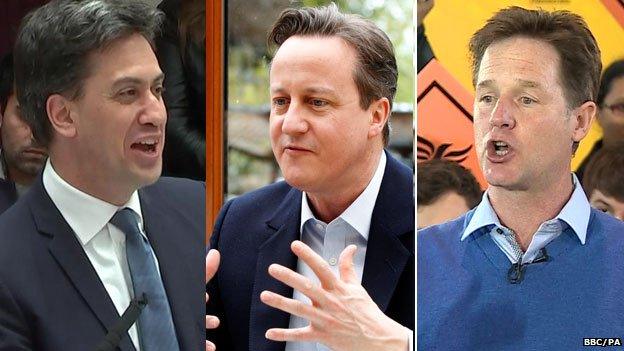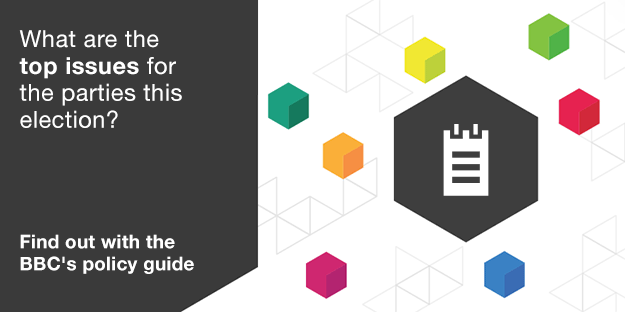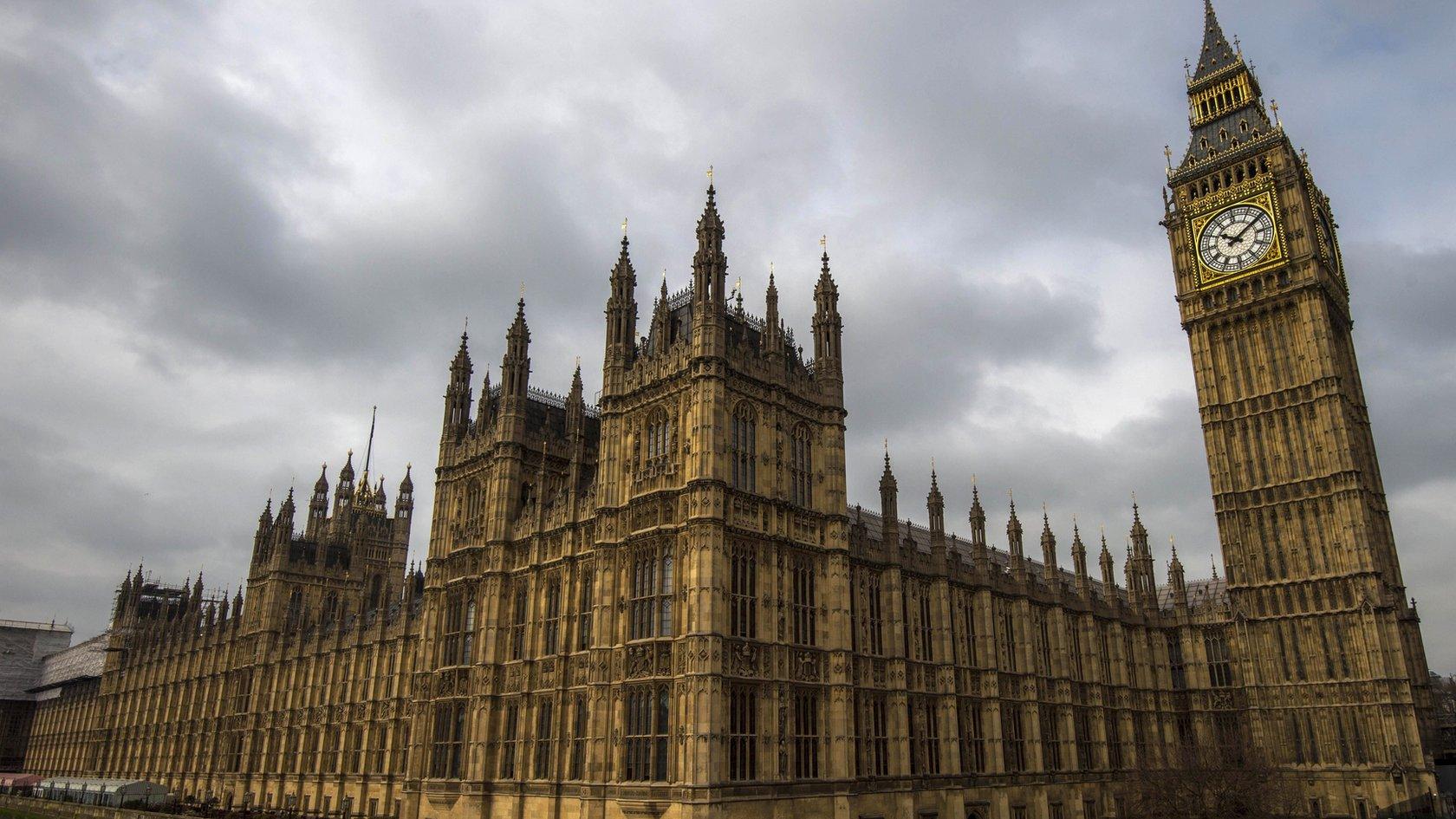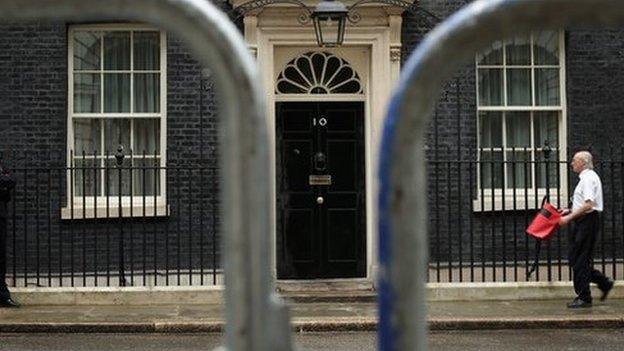Election 2015: Leaders rally voters on last weekend
- Published

Ed Miliband, David Cameron and Nick Clegg have been setting out their visions
The leaders of the UK's main political parties are using the last weekend of the election campaign to try to win over wavering voters.
David Cameron urged people to choose their "preferred PM" rather than vote tactically for the Lib Dems or UKIP.
Labour leader Ed Miliband said the election was a clash of two visions "about how our country succeeds".
Lib Dem leader Nick Clegg argued that it was unlikely either Labour or the Conservatives would win outright.
£7,000-a-year basic pension
Mr Cameron said people needed to vote Conservative if they wanted to stop Ed Miliband entering Downing Street on 8 May.
"In the end only one of two people can walk back through that door in Number 10 and be the prime minister on Friday," he told BBC's Breakfast programme.
"If you want your preferred prime minister, vote for your preferred prime minister.
"Don't take a risk thinking 'I'll vote Liberal Democrat and hope I get the prime minister I want' or UKIP and hope somehow it emerges."
In other election news:
Former shadow home secretary Ann Widdecombe, on a campaign visit for the Conservatives in Cardiff, said voters should ignore the smaller parties and make a straight choice between the Tories and Labour
The SNP's Nicola Sturgeon told voters in Inverness: "We've got to take any opportunity to get the Tories out."
Mr Farage, on a campaign visit in Ramsgate, Kent, said the one thing he had got wrong in the election campaign was thinking Mr Miliband would move towards offering a referendum on EU membership.
Mr Cameron, external, Mr Miliband, external, Mr Clegg, external, Mr Farage, , externalMs Sturgeon, external and the DUP's Peter Robinson, external were among politicians to tweet their congratulations to the Duke and Duchess of Cambridge on their new baby daughter
Chancellor George Osborne told the BBC's John Pienaar: "I'm really happy for the young couple... and I think the whole country will be thrilled that politics won't be on the front page of the Sunday newspapers tomorrow."
Mr Cameron said his comment on Friday that the election was a "career-defining" moment, which he then appeared to correct to a "country-defining" moment, had been intentional. "I meant it. I meant it for the people I was talking to," he said, referring to the audience at Asda in Leeds.
Mr Cameron made his appeal ahead of a visit to Didsbury, Greater Manchester, to promote the party's "pensioners' manifesto".
He met a group of pensioners and highlighted his party's commitment to the "triple lock" on state pensions, which means they rise by whichever is higher out of inflation, average wages, or 2.5%.
He said the triple lock - which Labour says it is also committed to - would take the annual basic state pension to £7,000 a year by 2020.
He also outlined other previously-announced proposals, including the protection of benefits such as free bus passes and TV licences, and giving people more freedom to invest and spend their pensions.
David Cameron: "I've said that it stays as it is... I couldn't have been clearer"
He earlier insisted there would be no cuts to child benefits as part of his pledge to make £12bn in welfare savings.
Meanwhile, on a visit to the marginal seat of Hastings on Saturday, Mr Miliband hit back at Conservative claims that the only way Labour could get a majority was with the SNP.
Instead he accused the Conservatives of using the SNP to distract voters from their own record.
"What this election really comes down to is not a clash of two nations but a clash of two visions," he said.
"Two different plans ideas about how our country succeeds."
He said the Conservatives offer "huge tax cuts" for the "rich and powerful", whereas Labour thinks "Britain succeeds when working people succeed".

But Labour former Scottish first minister Henry McLeish said Mr Miliband may have little choice but to negotiate with the Scottish Nationalists.
"At the end of the day, Ed is not going to exclude himself from being prime minister by not talking to anyone," he told BBC Radio 4's Today programme
Mr Miliband also used the East Sussex hustings to outline his party's plans to introduce bills for 10 of his manifesto proposals by the end of May.
These would include a "strong economic foundation bill" which would implement a mansion tax and tobacco levy; freezing energy prices until 2017; banning recruitment agencies from hiring only from overseas, and cutting university tuition fees from £9,000 to £6,000 in England.
'Arrangements, pacts, deals'
Addressing party activists in his Sheffield Hallam constituency, Mr Clegg set out plans to bring down youth unemployment "to its lowest level ever" by doubling the number of businesses that offer apprenticeships and creating 100,000 new work experience places.
He also said either Ed Miliband or David Cameron would walk into Number 10 after the election, but the question was "who is going to be there alongside" as neither of them would win outright.
Only the Liberal Democrats stood between UKIP's Nigel Farage, the SNP's Alex Salmond "and the door to Number 10", he said,
Later, he told reporters he would not enter "any arrangements, any pacts, any deals" with either UKIP or the SNP.
This was "for the simple reason that we fundamentally disagree with Nigel Farage's view that he wants to pull one union apart - the European Union - as we also fundamentally disagree with the SNP's will to pull another union - the United Kingdom - apart," he said.
He added: "In an election where no one wins a majority, it's really pretty simple: give the party which has nonetheless got more wind in its sails, a greater mandate from the British people, the opportunity to try and form a government.
"If they fail to do so, or choose not to do so, then alternative arrangements might need to be arrived at."


The best of BBC News' Election 2015 specials
- Published1 May 2015

- Published4 May 2015
